Overcoming Depression - The Most Important Thing


The world is
full of suffering, it is also full of overcoming it. Helen Keller
You can use antidepressants to normalize your brain biochemistry and go
jogging to increase your serotonin level. You can do many other things
staying within the narrow bounds of the traditional western medicine
contemplating a human being as a body busy with intricate biochemical
processes, and…
What’s next?
Everything has its cause and effect and the paragraph you’ve just read
(cause) provoked lots of letters from doctors addressing the Project
(effect) with a message that a person with no medical education may not
write about depression. My “why” is easily parried with “because you are not
a doctor”. Of course, they are right. Taboo is taboo. All the more so as all
the methods in contemporary psychiatry and psychotherapy are scientific and
based on in-depth knowledge. Aren’t they?
Do you believe in this? Or do you know...
...that it is faith, not knowledge, that science is based upon. Faith has
been dominating western science for three hundred years and was given the
names of English physicist Isaac Newton and French philosopher Rene
Descartes in whose writings it is based.
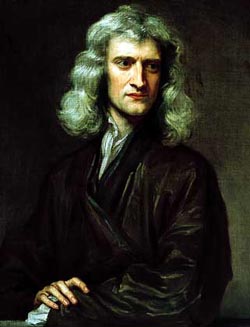 |
 |
|
Isaac Newton |
René Descartes |
It is surprising, however, that almost all the books explaining the views
of Newton and Descartes are silent on the role they attributed to spiritual
experiences. Why no mention is made of the more-than-serious interest Newton
took in astrology, alchemy, occultism or mysticism that were part of his
philosophy and made his biographers call him “not the first great scientist,
but the last great magician”. Newton said that universe was material in its
nature, but he did not think its origin could be explained from material
causes. The divine was central to his outlook; the divine that created
material particles, the energies between them and the laws to govern their
movement. Descartes said that the universe exists independently of the
person watching this universe. Having said this, he noted that the world is
constantly perceived and surveyed by the Divine Eye.
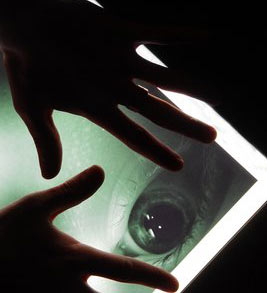
Descartes and Newton, like anybody practicing holistic ways, did not
separate between spirit and matter in their minds, but used words to convey
their knowledge, whereat words are dual in nature. It doesn't take a genius,
however, to understand why the followers of Newton and Descartes spoke only
about the matter, saying nothing about the spirit – in the 17th century, the
Divine and any related knowledge was a complete monopoly of the church (or
rather the CHURCH). This monopoly did not extend to the matter, hence,
everything relating to pure matter became known as “pure science”, while
pure spirit fell and is still under the religious jurisdiction. Pure? .
Pure?
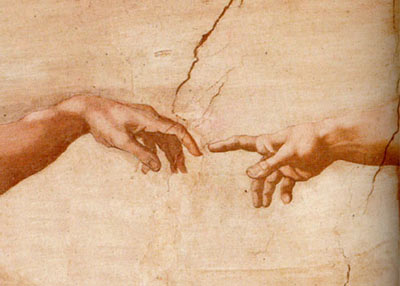
Yet, there is a fundamental difference between the
outlooks that Newton and Descartes and their followers had. The works
written by Newton or Descartes in the form of words and formulae are the
knowledge they were sure of – they knew. Their followers simply took
on trust the words of the great, treating them as dogma or postulate –
they believed. Can you feel the difference?
This situation lasted until the early 20th century,
when a man appeared brave enough to believe in the obvious. He was Albert
Einstein who published two wonderful articles in 1905. The first article
laid down the principles of the special theory of relativity, the second one
offered a new view of electromagnetic radiation forming basics of the
quantum theory. These theories disproved the key postulates explained by
Newtonian physics such as the space-time absoluteness, material nature of
the space, objective description of phenomena with no regard of the
observer. Since then, the space and time did no longer exist separately. The
space stopped being 3-dimensional and the time stopped being linear.
Physics textbooks are silent on the fact that many
great scientists such as Bohm, Heisenberg, Shredinger and Bohr did not only
consider their works well compatible with the oriental philosophy, but,
essentially, confirmed this philosophy with their research. The parallels
between the mystic vision and the explanations offered by the contemporary
physics are largely similar and there is every reason to believe that this
similarity will grow considerably.
Why is it said, in the books about Einstein, about his
theory of relativity and about the three (his?) hair in the soup, but
nothing is mentioned about Einstein having deep mystical emotions and that
it was he who said that “A human being is part of the whole called by us
universe, a part limited in time and space. We experience ourselves, our
thoughts and feelings as something separate from the rest. It is a kind of
optical delusion of consciousness. This delusion is a kind of prison for us,
restricting us to our personal desires and to affection for a few persons
nearest to us. Our task must be to free ourselves from the prison by
widening our circle of compassion to embrace all living creatures and the
whole of nature in its beauty…”.
Later on, Bell’s theorem presented physicists with an
unpleasant dilemma: either of the two is possible – either the universe is
not objectively existing or there are superlight connections operating in it
(which, as you might guess, is impossible in accordance with the Einstein’s
theory of relativity :)
The world-famous physicist David Bohm, who began his
practice with Einstein, described the nature of reality in general and that
of consciousness in particular as a certain flow that is in a constant state
of change and flux. Division into the internal and external is an illusion
existing in our minds only. Stable structures of any kind, as well as
objects and phenomena comprising the flow do not exist independently of each
other in reality. We accentuate certain categories out of the flow, because
this is how our mind works. This is how we were taught to see the world.
This is, certainly, not philosophy. This is quantum physics, and Bohm
explains this theory with the help of words since many people “are
unfamiliar with the mysteries of higher mathematics”.
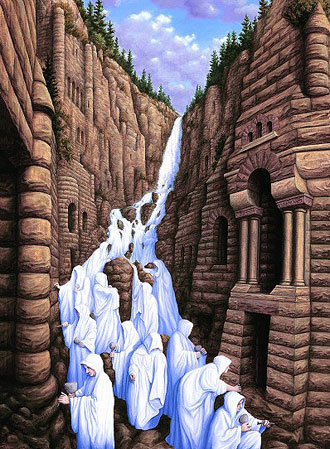
According to Bohm, neither idealists, nor materialists
are right since neither consciousness nor matter can be explained through or
narrowed down to each other. Both are an illusion, as well as any and all
knowledge of the so called “objective reality” described by scientists. You
don’t have to be good at quantum physics to understand that the world and
our view of the world are significantly different. Many a man believes that
what they see is a true reality, whereas this is nothing more than an
amusing misapprehension. What you see is merely an optical projection of the
world onto the retina of the eye, which is subsequently transformed into an
electrical impulse, which uses sensory canals to run into the brain, where
it is finally processed. Hence, what you see is a result of an at least
double transformation, i.e. optical and electric, which is later censored by
the brain. In the end, you “see” only what your brain allows you to
apprehend. If a man could see the world with the eyes of a different living
being or with the eyes of a child, the picture of the world would be
completely different. A very good model of what a world and its picture are
may be found in the Matrix movie. “Your mind makes it real”.

The reason why men perceive the world in this way is,
also, as Bohm believes, in the structure of the language we use, which needs
to identify subjects, objects and verbs to link them. Here is a considerably
logical statement: “You (object) suffer
(verb) from depression
(subject)”. Indeed, there is “You”, there is “depression” and there
is “suffering”. But if, one day, you understand that your “I” (or “ego”) is
an illusion, that the word “depression” is a notion that was once created by
the minds of psychiatrists, there will be “nobody” to suffer and “nothing”
to suffer about and the “suffering” itself will become an illusion.
I understand that many of you will find the last
sentence more than abstract, but I wrote it for a reason – for 13 years I
(object) suffered (verb)
from severe endogenous depression (subject) and
I am well aware of what “depression” and “suffering” are. But one day I
realized how illusory my “I” is, and the suffering disappeared from my life.
This is impossible to apprehend mentally or to explain with words within the
scope of this article – it happened after several years and several thousand
hours of meditation, when the multitude of rigid concepts and ideas left my
mind. Then I understood that the words people use to call “suffering”,
“ego”, “depression” exist only in their minds and that it is merely an
illusion. Do you understand? Or? Oder? If not, read David Bohm (at least,
the “unfolding meaning”), find a good meditation teacher and, in full
compliance with the theory of relativity, in several years of meditation,
your mind will undergo analogous changes. And I mean it.

Medicine
Unlike in physics, changes occur much slower in psychology and
psychiatry. Here, the vision that has been for long treated as outdated in
physics is still regarded as science-based. Observations and facts
contradicting the mechanistic approach to describing a human-being are most
often rejected and the research at odds with the dogma receives no
financing, and...
Going back to the topic
As you remember, the article began with me saying that
you can experience many things staying within the narrow bounds of the
traditional western medicine treating a human being as a body busy with
intricate biochemical processes and…
So what’s next on our agenda?
You may follow said path. As the research tools improve, these processes
will require more sophisticated descriptions, will need to be split into
more elaborated components for understanding, and will require extended
terminology for explaining. The cognitive process is endless – the future
will bring brilliant theories giving birth to completely new depression
cures that will supersede or change significantly the two cure methods
dominating today, namely, psychotherapy that is hardly 100 years old and
drug treatment that is only 50 years old.
To date, the theory of biologically caused depression
is dominating the medical industry. Per this theory, depression frustrates
certain biochemical processes in our brain. Theory is useless without
practice and the practice is so that pharmacological industry offers new
chemical substances helping to normalize our brain mechanisms, and today the
annual catalogue for new antidepressants is 3.5 cm thick. And it’s only the
beginning. The success of the biological theory for depression is confirmed
with results of public opinion polls in the USA for the greatest 20th
century invention. It was not the theory of relativity or Internet that
topped the chart, but a small Prozac pill.

Why then, given such a wonderful theory, hundreds of
millions of people throughout the whole world continue suffering from
depression and approximately 4 million people annually commit suicide
because of depression. Maybe this theory does not work that well in
practice?
Contemporary western medicine employs the materialistic
concept, under which consciousness is nothing else but a brain product that
disappears once the brain is dead. On the other hand, numerous research
studies conducted mostly in the UK and American institutions showed that
clinical death undergone by many people does not terminate their feelings
even when the brain’s electrical activity is lost completely. It was not the
kind of experience perceived by them (if they saw bright light, saw their
body from outside or heard any voices) that interested the researchers. They
were interested rather in the very fact of going through a certain
experience and presence or absence of electrical activity of the brain at
the time when clinical death happens. Having accumulated some impressive
statistics, the researchers concluded that feelings are present irrespective
of whether or not the brain electric activity persists or is lost
completely. As you can understand, if consciousness is a brain product, a
man cannot experience anything when no electric activity is registered. It
is like watching TV when it is unplugged.
Furthermore, some famous neurosurgeons, for instance
Dr. Wilder Penfield (the world-famous neurosurgeon engaged in in-depth
studies of the brain contributing a lot to the contemporary
neurophysiology), doubted that consciousness is a brain product and may be
explained in terms of cerebral anatomy or physiology. Neurosurgeon Karl
Pribram, who spent decades on experimental neurosurgery and
electrophysiology and is reputed as the leading brain scientist, employed
Bohm’s theory in his studies and concluded that memories are stored in all
parts of the brain cortex and their intensity depends on the total number of
brain cells being active and that not only chemical substances, but also
waves help transmitting information between neurons. This provided a new
explanation for why brain functions may be regarded as both localized and
distributed.
Western medicine is approaching the idea that is taken
for granted in the East, i.e. that our brain is a “receiver” rather than
“generator” of consciousness. A TV-set is a perfect analogy for this. To
adjust a TV-set, a repair technician does not need to know anything about
the transmitter; he should only know the ropes of how the receiver works. It
is a common knowledge that the simpler a device the safer and easier it is
to use. In the 20th century psychiatry, this principle was applied to the
effect that “unwanted” brain regions of the people with abnormal (in terms
of psychiatry) behavior were simply cut away in a lobotomy or other
fascinating operations that were later acknowledged as “completely wrong”.
Now, they are applied in shock therapy, such as ECT undergone by
approximately 100,000 people annually. The oddest thing about it is that ECT
is used by psychiatrists without them knowing exactly “why” and “how” the
treatment works. On the other hand, it is not strange at all – everybody
knows that to eliminate tv disturbances, it suffices to hit the TV-set. Very
often it would help. I’m telling you this as a radio engineer :) I am
serious :(
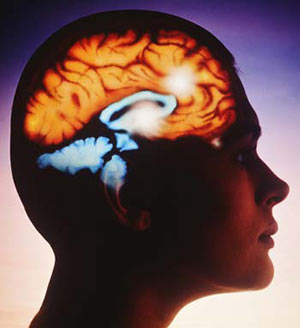
Most often, medicine denies everything associated with mysticism or
religion, or, at best, tries to fit them into whatever theory. Freud was
very good at it and explained religious and mystical experiences with
neuroses and obsessions, which is perfectly fair with respect to their
external ceremonial side. These theories, however, provide no explanation
for the experience an individual has perceiving reality that forms basis of
every major religion in the world. No less superficial are numerous
psychoanalytic theories contemplating wars, revolutions, genocide and
totalitarian rule as a result of child trauma and other events found in the
biographies of historical figures. Psychiatric theories analyzing the works
of great painters or writers in terms of psychiatric diagnoses and
pathologies are very interesting, particularly, in practice – if you try and
do some self-diagnosis, you are sure to find some curious little
abnormality.
Depression or description of depression?
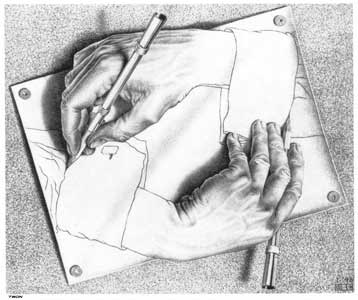
More than two thousand years ago, Hippocrates selected a certain
phenomenon from a variety of things and phenomena and called it melancholy.
Time passed by, melancholy started being called “acedia”, then “spleen”,
until the word “depression” appeared recently. Languages developed,
cognitive tools improved, which provided for more precise and detailed
descriptions of phenomena. This is great, but, at a certain stage,
differences between a description and the phenomenon itself
disappeared from people’s minds, and it is a very important point. There
will be newer and more sophisticated theories explaining melanch….depression.
But, essentially, a scientist creating a new theory simply takes off its old
glasses and puts on some new glasses, through which this phenomenon is seen
at a different, though more beneficial, angle. Yet, the glasses will remain
glasses, and science will remain knowledge based on a belief that exactly
these glasses give you the truest picture of the day,
whereas hot discussions are held sometimes, where glasses might be broken.
Currently, it is the biological theory for depression that rules the day
treating the brain as a generator, and not receiver of consciousness. People
who use this theory in practice, namely psychiatrists, psychotherapists and
psychologists, know this theory very well and believe in it. Plenty of time
will pass until this theory will be replaced with a different scientific
theory. It won’t happen soon, since a new theory may be accepted only by a
new generation. It is a natural way for science to develop, which Max Planck
perfectly voiced: “A scientific truth does not triumph by convincing its
opponents and making them see the light, but rather because its opponents
eventually die and a new generation grows up that is familiar with it”.
You always have a choice and
You can join in this process or try and step over the bounds of the
traditional western medicine right now becoming aware of what is called,
under different religious and mystical traditions, Soul, Spirit or Mind. It
is something beyond the words and, hence, cannot be described by science
working only with specific notions that can be translated into words and
treats everything else as non-existing. Words will always remain words –
splendid wine for the minds of those who chose life concept (or its
description or theory or model) instead of life. For those who take map of
the world for the world.

Depression is not only a physical bodily disease, but a spiritual one, while
the spiritual opts out of the medical framework – it is a territory of
mystical and religious traditions. There are many religions in the world,
but their variety is not a disadvantage, but rather a great gift for the
humanity. Many traditions have invaluable time-tested methods at their
disposal. People are very different and the methods that would lead the Path
for one person will often not work for another. There is no and never will
be the only true religion and orthodox statements like “Only we know the
truth” sound rather funny. Each of us has it own way and this uniqueness
makes men so great and beautiful.
I travelled down many paths, but found my way only after many years in
search. In my case, it was Buddhism I found, its philosophy and practices
coinciding with my feelings a lot. Thanks to these techniques, I could beat
my depression. It took me several years and several thousand hours of
practice. Of course, I continue practicing the techniques several hours a
day now. At first, the practice was a heavy duty for me, turning into a
habit later and becoming, finally, a true pleasure. It is impossible to
describe with words how Buddhist practices helped me overcoming the
depression – any words will create a new concept, a useless dead
description. Just the other way round, this happened because words and
concepts left my mind and I stopped believing in what is taken for granted
today. Now, I don’t believe in what is called “laws” or “axioms” crating a
certain frame of reference in an ordinary man’s mind. I believe that
everything is possible and no limits exist. I believe in myself. And
depression? I don’t believe in depression.
Faith or trust

Faith is the most important thing in overcoming depression. It is not
faith in God, but faith in the method you are using. I, however, prefer
saying “trust”. Having an absolute trust in whatever you are doing cannot
but bring success. This refers to everything and even to the methods that
might seem completely mechanical, such as taking antidepressants. Any good
psychiatrist will say there is no point taking antidepressants unless you
believe they will help you.
You might be questioning yourself “Why me?”. Indeed, “why”? Nothing happens
for no reason. You depression is for a reason, too. Yes, it drains energies
and meaning, but why do You suffer depression and somebody‘s having
trouble with painful joins (and questioning itself – why me?).
Depression is a disease treated as a mental illness, but division into
“corporal” and “mental” diseases exists in the minds of doctors only.
Several years ago, once another depression bout was over, empty and
exhausted, I asked that my spiritual unrest be substituted with physical
pain. Who did I ask? It was a request to all, even not a request, but a
heart cry from a little human-being to the great Universe. And it heard me –
I got my physical pain. I started having painful joints. The pain was
nagging, exhausting. I was prescribed pain-killers that would provide almost
no relief and it seemed to me, sometimes, I was about to go mad. I could
bear it for several months and asked that, if possible, everything be the
way it was before, as if I never had the request. Some time later, I had it
back.
Everything described in the “Overcoming Depression” Section is aimed at
performing a certain action, but there is an exception to every rule. In
some situations, it is wise not to strain oneself struggling the depression
but to lay low and, I am tempted to say, “to surrender”. Hurricane damages
large and strong trees and bends down flexible plants. Not every situation
can be changed, but most of them may be accepted. Thousands of years ago
Solomon found words to capture the essence of meekness: “Grant me the
serenity to accept the things I cannot change; the courage to change the
things I can; and the wisdom to know the difference”.
Carl Gustav Jung, the man who knew, said: “Depression is a woman in black
knocking on your door. If you turn her out of doors, she’ll stay at your
door forever. But if you invite her, offer her a seat and feed her and,
after that, ask her about the purpose of the visit, you have a chance of
saying farewell to her”.
Every state is conditioned by certain causes and depression is no exception.
These causes will condition your depression until you sort them out. Do you
understand? Sort out the causes, not the consequences. This is no to say
that the “investigation” should result in a neat list of causes to your
depression. Yes, your depression is due to many reasons, but these reasons,
in turn, are due to other, earlier, reasons, and so on, indefinitely – tens
of rivers running into the sea of your depression are fed by hundreds of
smaller rivers fed by thousands of brooks, etc. One life won’t be enough to
reach the small rivers, let alone the brooks. Hence, “to sort out” is not
a word, but a gut feeling and if you find your way and are
sufficiently persistent, you will feel the result of your efforts.
Ways to overcome depression

There is a way out of any situation and just because you are not seeing
it at the moment doesn’t mean it is not there. You need to look to see the
way out and, to look, you need free space in your mind. Space to see Your
situation from outside. A depressed person usually doesn’t have that space
in his/her mind. No free space at all, because all available space is filled
with negative emotions. I understand that these words might sound abstract
for many of you and this is only due to it being extremely difficult
expressing it with words. I don’t know what concepts live in your mind at
the moment and if there is any space free from concepts in your mind.
In either case, there are at least four ways you can follow:
1. You can treat the consequences or, in terms of traditional medicine,
symptoms. By using different techniques, you can have your symptoms
disappear or reduced. To date, antidepressants are the most popular method
on this route. I followed this way for 13 years and tried almost everything
on offer by the traditional medicine.
2. You can look for an external source and find a person with enough space
and potential to see a way out of your situation who might be able to help
you finding the way. Psychotherapists and psychologists usually play this
role.
3. You can go inside and create space in your mind. There are specific
techniques for this and this trip will take you at least several years. On
this route, you will also need somebody who is usually called a teacher to
show you the door, whereas only you can reach the door and open it (the
previous way alike). This is the way I chose (after following the 1st
scenario for 13 years) and, in several years, during the meditation, I
looked inside myself and could find neither the depression, not the “myself”
suffering from depression. Or, on the other hand,
depression could not find me. 4. This is the way chosen by most
people. The point is that severe and prolonged depression fills one’s mind
with negative impressions leaving no space or energy or meaning. In this
case, WAITING remains the only possibility. It is easy to utter this word,
but extremely difficult to wait watching endless days turning into endless
weeks and weeks turning into months. And nothing seems to change. Nothing
helps. Everything remains the same. Usually, however, it is a consequence of
pessimistic thinking typical of depression. Everything changes – nothing is
permanent. At this stage, your only weapon is your knowledge that depression
cannot last forever. I am not even asking you to believe, as faith needs
energy, just know that any depression is sure to be over. Simply keep this
knowledge. Know that
There is always a way out, and You are no
exception to the rules

|